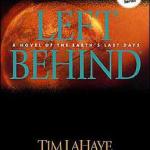Left Behind, pg. 237
Chloe Steele is a bit hesitant to embrace her father's newfound apocalyptic faith. "I have to be intellectually honest with myself," she says.
The implication is that her father's premillennial dispensationalist sect seems intellectually dishonest. The word "intellectually" is the key there for LaHaye and Jenkins. They come from the visceral, experiential strain of evangelicalism, so for them "intellectual" is always bad. Their particular PMD variant of this strain arises from, and relies heavily upon, anti-intellectualism.
Our authors, therefore, regard Chloe's phrase — "intellectually honest" — as an oxymoron. Anything intellectual, they believe, is fundamentally dishonest. There is, for them, no such thing as sophia apart from sophistry.
Chloe's "intellectual" objections are never explained or described. The authors cannot imagine what the substance of such objections might be. Nor do they care. If those objections are intellectual, then they are anti-faith, and that is all that they or their readers need to know.
Evangelicals are hardly alone in believing that faith and the intellect are incompatible. This misconception is quite popular among people who misunderstand one or the other (or both). Miracle on 34th Street was on cable the other night. Edmund Gwenn is terrific, but I still can't abide that film's refrain: "Faith is believing when common sense tells you not to."
No. Faith is the substance of things hoped for, the evidence of things not seen. "Believing when common sense tells you not to" is something else. That's called "denial." The former involves belief in something that cannot be proved true, the latter involves belief in something that can be — or has been — proved false. The former requires a vital intellect, the latter necessarily regards the intellect with fear and suspicion.*
Mix in some anger with that fear and suspicion and you get Rayford's reaction to his daughter's comment about intellectual honesty:
It was all Rayford could do to stay calm. Had he been this pseudosophisticated at that age? Of course he had. He had run everything through that maddening intellectual grid — until recently, when the supernatural came crashing through his academic pretense. But like the cabbie had said, you'd have to be blind not to see the light now, no matter how educated you thought you were.
We can only give the authors partial credit for this impressively anti-intellectual paragraph. They managed to work in dismissive references to sophistication, intellect, academia and education, but of course for full credit, they would also need to have mentioned chardonnay, brie, the French and Ivy-League elites.
This is the first we've seen or heard of Rayford Steele's "academic pretense." (I'm picturing him in the cockpit, wearing a tweed jacket with leather patches on the elbows, smoking a pipe and explaining to his copilot that altitude is merely a social construct.) Our hero is certainly pretentious, but his is the pose of someone who's trying to pretend he's Steve McQueen, not of someone who's trying to pretend he's Stephen Hawking.
Rayford's "academic pretense" is only retro-introduced here in order to note that it had been swept away "when the supernatural came crashing through." This is a major theme of Left Behind, and the characteristic that distinguishes it from most other evangelical apocalyptic fiction.
Most such stories — think of the literal cult-film A Thief in the Night — are mainly concerned with trying to scare people into Heaven.** They function as hellfire-and-brimstone sermons, complete with altar call, except instead of telling people they're going to Hell, these stories tell people that Hell is coming to them.
I'm not a fan of this scared-straight approach to evangelism, but at least it arises from heartfelt good intentions. The brimstone preachers may have a disturbing notion of the character of God, but given that notion as their premise, they're acting out of genuine concern for others. Left Behind, by contrast, is less interested in saving unbelievers from Hell than in "proving" that they're wrong. And since they're wrong, they deserve what they're going to get.
For all its faults, the message of A Thief in the Night was something like, "Please, repent and save yourselves from suffering and Hell." A pervasive message of LB is something more like, "You'll see. We're right and you intellectuals are wrong. Neener, neener. Have fun in Hell."
One of the stranger things about LB is the way the authors seem to think that their novel, their work of fiction, serves as "proof" of their claims. They seem to think it not only illustrates, but demonstrates, that faith conquers reason and that Scofield's notes are canonical rather than heretical. They've created a fictional reality in which their weird theories are true. In this fictional world, all who disagree appear as fools. Taking potshots at one's opponents through fiction is nothing new — the political disputes of Dante's Florence are immortalized in the Divine Comedy. But Dante didn't seem to think that he had settled the argument by condemning his opponents to a fictional Inferno.
Chloe Steele is trying to remain neutral in the supposed war between faith and reason. Such neutrality, the authors suggest, is untenable. Chloe, like everyone, must choose sides. And when faith conquers reason — when the supernatural crashes through academic pretense — you'd better be on the right side. Or else.
You'll see.
– – – – – – – – – – – –
* On the subject of anti-intellectualism in American evangelicalism, let me recommend yet again Mark Noll's wonderful The Scandal of the Evangelical Mind. Here's a small taste from Noll, in which he in turn recommends two other excellent books on the subject:
Recently two very good, but also very disquieting, books have illustrated the weaknesses of evangelical intellectual life. Both are from historians who teach at the University of Wisconsin. Ronald Numbers's book The Creationists (Knopf, 1992) explains how a popular belief known as "creationism" — a theory that the earth is ten thousand or less years old — has spread like wildfire in [the 20th] century from its humble beginnings in the writings of Ellen White, the founder of Seventh-day Adventism, to its current status as a gospel truth embraced by tens of millions of Bible-believing evangelicals and fundamentalists around the world. Paul Boyer's When Time Shall Be No More: Prophecy Belief in Modern American Culture (Harvard University Press, 1992) documents the remarkable popularity among American Bible-believing Christians — again mostly evangelicals and fundamentalists — of radical apocalyptic speculation. Boyer concludes that Christian fascination with the end of the world has existed for a very long time, but also that recent evangelical fixation on such matters — where contemporary events are labeled with great self-confidence as the fulfillment of biblical prophecies heralding the End of Time — has been particularly intense. …
Both Numbers and Boyer are first-rate scholars who write with sympathy for their subjects. Neither is an antireligious zealot. But their books tell a sad tale: Numbers describes how a fatally flawed interpretive scheme of the sort that no responsible Christian teacher in the history of the church ever endorsed before [the 20th] century came to dominate he minds of American evangelicals on scientific questions; Boyer discusses how an equally unsound hermeneutic has been used with wanton abandon to dominate 20th-century evangelical thinking about world affairs. …
They share in common a picture of an evangelical world almost completely adrift in using the mind for careful thought about the world. As the authors describe them, evangelicals — bereft of self-criticism, intellectual subtlety, or an awareness of complexity — are blown about by every wind of apocalyptic speculation and enslaved to the cruder spirits of populist science. In reality, Numbers and Boyer show even more — they show millions of evangelicals thinking they are honoring the Scriptures, yet interpreting the Scriptures on questions of science and world affairs in ways that fundamentally contradict the deeper, broader and historically well-established meanings of the Bible itself.
** A strange side-effect of spending so much time with Left Behind has been an increased appreciation for earlier, less-awful works of apocalyptic fiction. Before reading LB, I regarded Thief and its sequels as inconsequential, inept pieces of dreck. But by getting everything wrong, LB illustrates that Thief wasn't actually as bad as it could have been. By resetting the bar so much lower, LB enhances the reputations of its predecessors. It's kind of like the way we're having to reconsider the presidency of George H.W. Bush.
















